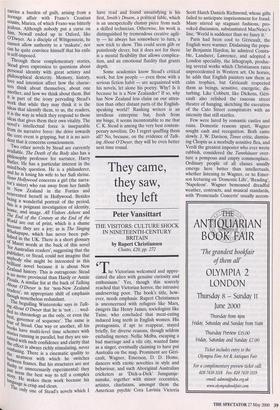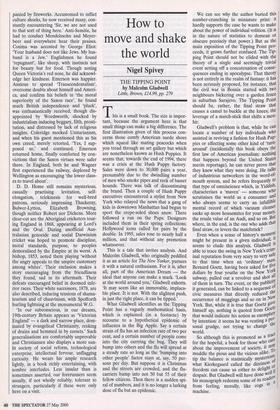They came, they saw, they left
Peter Vansittart
THE VISITORS: CULTURE SHOCK IN NINETEENTH-CENTURY BRITAIN by Rupert Christiansen Chatto, £20, pp. 272 The Victorians welcomed and appre- ciated the alien with genuine curiosity and enthusiasm.' Yes, though this scarcely reached that Victorian horror, the intrusive undeserving poor. The book's title, how- ever, needs emphasis: Rupert Christiansen is unconcerned with refugees like Marx, emigres like Henry James, sociologists like Taine, who concluded that meat-eating induced long teeth in English women. His protagonists, if apt to reappear, stayed briefly, for diverse reasons, though seldom excluding money. Nellie Melba, escaping a bad marriage and a vile city, wanted fame as a singer, eventually claiming to have put Australia on the map. Prominent are Geri- cault, Wagner, Emerson, D. D. Home, dancers with exotic novelties in style and behaviour, and such Aboriginal Australian cricketers as Dick-a-Dick' Jumgumje- nanuke, together with minor eccentrics, artistes, charlatans, amongst them the American psychic Cora Lavinia Victoria Scott Hatch Daniels Richmond, whose gifts failed to anticipate imprisonment for fraud. Many stirred up stagnant fashions, pro- voked discussion, substantiated MacNeice's line, 'World is suddener than we fancy it.'
Paris had been cool to Gericault, the English were warmer. Disdaining the popu- lar Benjamin Haydon, he admired Consta- ble, Landseer, Lawrence, and adopted a London speciality, the lithograph, produc- ing several works which Christiansen rates unprecedented in Western art. On horses, he adds that English painters saw them as calm trophies, but Gericault respected them as beings, sensitive, energetic, dis- turbing. Like Cobbett, like Dickens, Geri- cault also relished the raucous street theatre of hanging, sketching the execution of the Cato Street conspirators with an intensity that still startles.
Few were lured by romantic castles and ruins. Domestic reasons apart, Wagner sought cash and recognition. Both came slowly. J. W. Davison, Times critic, dismiss- ing Chopin as a morbidly sensitive flea, and Verdi the greatest imposter who ever wrote rubbish, considered the Tannhauser over- ture a pompous and empty commonplace. Ordinary people of all classes usually emerge here better than intellectuals, whether listening to Wagner, or to Emer- son lecturing on 'Domestic Life', 'Reading', `Napoleon'. Wagner bemoaned dreadful weather, contracts, and musical standards, with 'Promenade Concerts' usually accom- panied by fireworks. Accustomed to inflict culture shocks, he now received many, con- stantly encountering 'Sir, we are not used to that sort of thing here.' Anti-Semitic, he had to conduct Mendelssohn and Meyer- beer and everywhere hear their praises. Cosima was accosted by George Eliot: `Your husband does not like Jews. My hus- band is a Jew.' Englishmen he found `repugnant', like sheep, with instincts not for beauty but for food. Though noting Queen Victoria's red nose, he did acknowl- edge her kindness. Emerson was happier. Anxious to spread 'Transcendentalism', overcome doubts about himself and Ameri- ca, and confirm his beliefs in 'the moral superiority of the Saxon race', he found much British independence and 'pluck', was enthusiastically received, though dis- appointed by Wordsworth, shocked by industrialism inducing beggary, filth, prosti- tution, and distressed by lack of religious insights. Coleridge mocked Unitarianism, and when his guest mentioned this as his own creed, merely retorted, 'Yes, I sup- posed so,' and continued. Emerson returned home, finally comforted by con- victions that the Saxon virtues were safer there. In England, both he and Wagner first experienced the railway, deplored by Wellington as encouraging 'the lower class- es to travel about'.
D. D. Home still remains mysterious, casually practising levitation, self- elongation, telekinesis for well-bred patrons, seriously impressing Thackeray, Buiwer-Lytton, Elizabeth Browning, though neither Robert nor Dickens. More clear-cut are the Aboriginal cricketers tour- ing England in 1868, appearing at Lord's and the Oval. During unofficial Aus- tralasian genocide and social Darwinism cricket was hoped to promote discipline, moral standards, purpose, to peoples demoralised by the Empire at its worst. A bishop, 1853, noted them playing 'without the angry appeals to the umpire customary among whites'. Their exclusion makes a story encouraging from the friendliness they found, sad in its aftermath. Their defeats encouraged belief in doomed infe- rior races. Their white successors, 1878, are also described, inducing tensions of shama- teurism and of chauvinism, with Spofforth hurling lightning at the monumental W.G.
`In our subconscious, in our dreams, 19th-century Britain appears as 'Victorian England' — a dark and narrow place, dom- inated by evangelical Christianity, reeking of drains and hemmed in by corsets.' Such generalisations are comfortably unprovable and Christiansen also displays a more sun- lit society of social reform, technological enterprise, intellectual fervour, unflagging curiosity. He wears his ample research lightly, in a book richly entertaining, with sombre interludes. Less insular than is sometimes asserted, our forerunners seem usually, if not wholly reliably, tolerant to strangers, particularly if these were only here on a visit.



































































 Previous page
Previous page